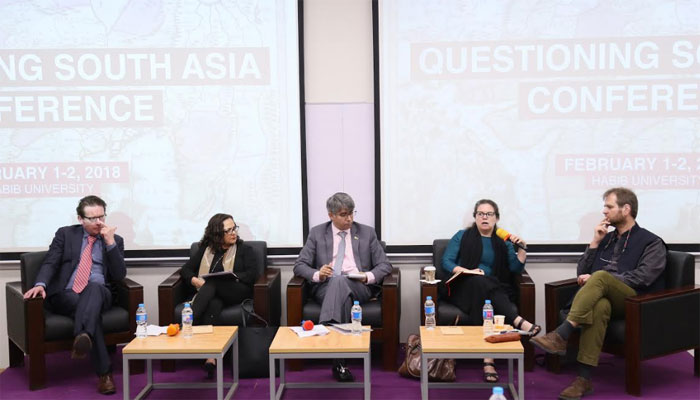Karachi: A two-day international conference titled ‘Questioning South Asia’ was held at Habib University on February 01 and 02.
The conference invited contributions from scholars willing to think beyond the construct of South Asia as a territorially bound space with discrete nations. Both days of the conference saw attendance by large numbers of people including academics, students, and civil society representatives.
The conference brought together top global academics from South Asia, the USA and UK and Pakistan, including the eminent scholar Dr. Markus Daechsel from Royal Holloway, University of London, whose keynote speech addressed the nature and value of history in South Asia.
The two-day conference was organized around five panels, the first panel, ‘Revisiting Urdu Literary Traditions in South Asia’, offered insights into the diverse genre and forms of cultural representation of the region.
The second panel, ‘The Politics of Othering in South Asia: Secularization, Identity and Environment’, illuminated the pressing contemporary challenges effecting the world.
The third panel, ‘Performance, Language, and Politics’, highlighted the cultural logic of South Asian societies.
The fourth panel, ‘Retheorizing South Asia’, brought together two well-known academics, Dr. Edward Simpson of SOAS, University of London, and Dr. Aasim Sajjad Akhtar of Quaid-e-Azam University.
Both speakers reflected upon the changing contours of the region due to mega infrastructure projects.
The fifth panel, ‘Religious Movements, State and National Identity’, offered an insightful commentary on the confluences of religion and politics.
The conference also arranged a roundtable discussion, Future of South Asian Studies and Research, engaging eminent scholars in the field.
The discussion was guided by the key questions, What is ‘South Asian Studies’ and what role it plays in shaping the intellectual discourse and the allocation of resources to the various inquiries taking place under its rubric. How can productive and equal collaborations take place between such emerging institutions in the postcolonial world and their counterparts in the ‘west’?
The conference ended with a commitment of raising awareness on global issues.
-
Security forces gun down 30 terrorists in multiple IBOs in KP: ISPR
-
MQM-P calls for new province in Sindh
-
US report validates Pakistan military edge over India: PM
-
Banned TTP poses serious threat to Pakistan security: UNSC panel
-
CM Afridi clarifies remarks on by-poll after ECP requests army deployment
-
Dubai sees 3.2m Pakistani passengers in 2025 as airport sets new milestone
-
Security forces kill 23 Indian proxy terrorists in KP's Kurram
-
Pakistan to construct island to boost oil exploration: report












